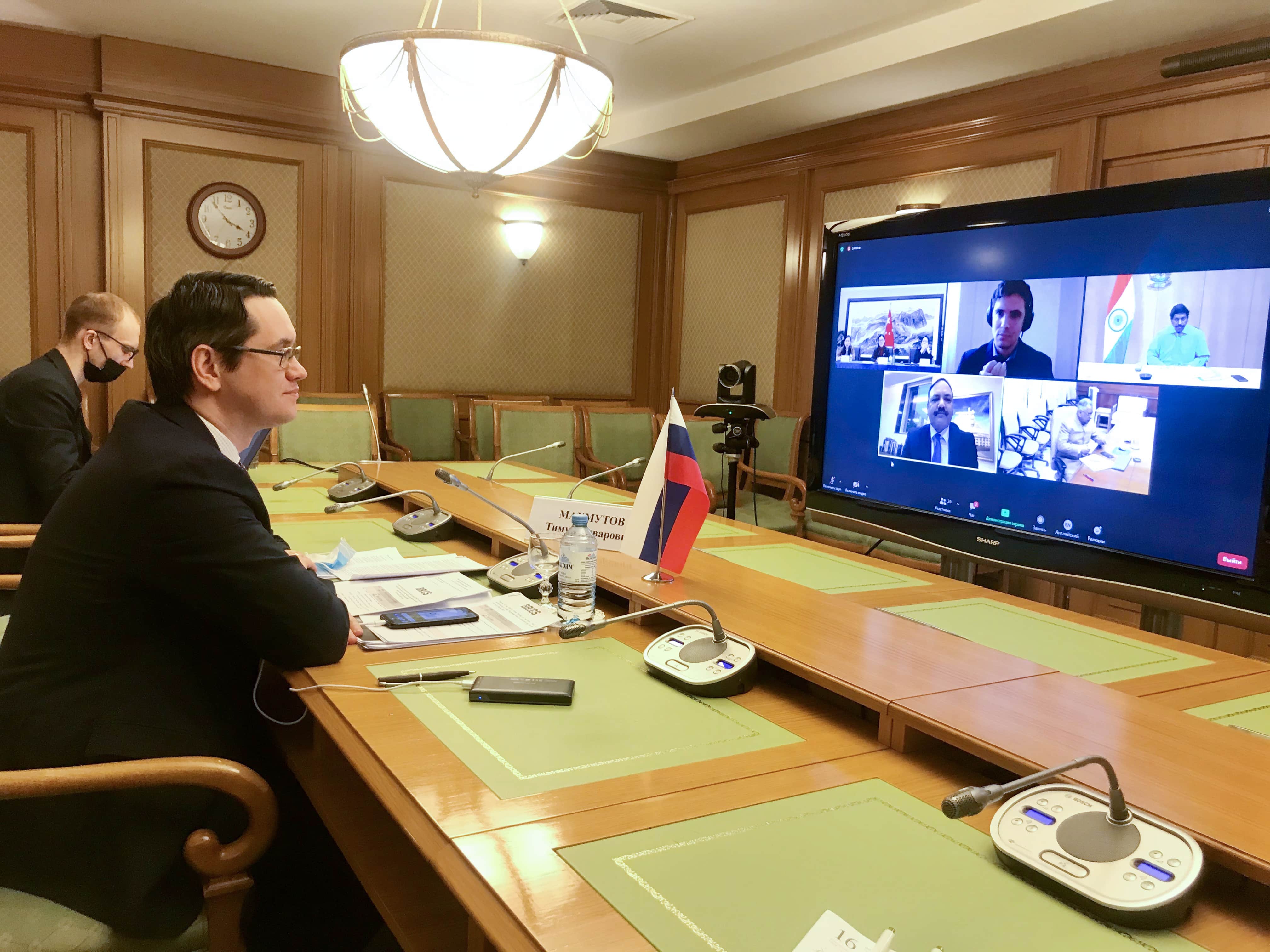
Accounts Chamber of the Russian Federation participates in the BRICS SAIs meeting to discuss the audit of implementation of public programs related to education and health
The seminar was held online by SAI India in the framework of international cooperation of the Supreme Audit Institutions of the BRICS countries. Representatives from the BRICS SAIs (Brazil, Russia, India, China and South Africa) delivered presentations on the audit in the fields of healthcare and education.
Ms. Natalia Ten, Lead Inspector of the Department of Health and Sports Audit of the Accounts Chamber of the Russian Federation, spoke on the “Progress Monitoring of the Healthcare National Project”. The presentation focused on the Audit Objectives and Auditees, assessing the quality and the progress of the national, federal and regional project development and analyzing the expected results, possibilities for achieving the goals and risks of implementing national, federal and regional projects on healthcare.
The monitoring has revealed that the regulatory and methodological framework does not fully encompass unified methodological approaches to a number of issues in the process of developing and implementing the national project.
Ms. Ten concluded that the risks of not achieving the targets of the national project and federal projects in 2020, are considered primarily due to the deterioration of the epidemiological situation resulting from the coronavirus pandemic and the re-profiling of a number of healthcare organizations to treat COVID–19 patients.
Representatives of SAI India, Mr. Sunil S Dadhe and Mr. Ashok Sinha, focused their presentation on general standards that apply to SAI India’s principles of social sector auditing. They also dwelled on the principles relating to the basic audit concepts, which shall be considered by auditors prior to commencement and at more than one point during the audit process like ethics and independence, professional judgement, quality control, audit risk, materiality, etc.
In the healthcare sector, India, like many countries, faces a number of challenges: shortages of equipment and medical personnel, inflated bills for services, misuse of hospital facilities, delays in supplies, and problems with certification and licensing of medication. In the field of education, one of the main tasks is to ensure universal access to education and improve the level of training of students and teachers.
SAI China’s presentation touched upon audit issues in the field of providing quality education that meets the needs of society. Ms. Weng Hongya focused her report on such important audit objects as: school infrastructure and its accessibility in rural areas, logistics and transport safety of students.
Particular attention was paid to the financing and quality of schools and higher education, as well as its compliance with the expectations of citizens. One of the positive aspects of the Chinese experience is the active use of new technologies and the smooth interaction of China's control bodies at all levels.
Noting the importance of implementing the Sustainable Development Goals, SAI South Africa's presentation focused on a comprehensive approach to auditing issues related to the healthcare and education, the use of new technologies and inclusiveness aspects. Ms. Kgabo Komape spoke about a real-time audit which was conducted in 2020, the results of which were included in the special report on the South African government's response to the COVID-19 crisis.
Mr. Andries Sekgetho mentioned that in the field of healthcare, in particular, the audit revealed a number of problems: violation of the processes of government procurement, drawbacks in storage and distribution of necessary medical equipment and medicines.
Mr. Paulo Malheiros da Franca Junior from SAI Brazil presented a report on the special program (in the framework of “TCU-Coopera” initiative) aimed at overcoming the COVID-19 crisis, which puts a special attention to the risk-based audit approach on the implementation of federal educational programs. In particular, the presentation notes that the crisis has exposed a number of difficulties associated with poor interaction between the authorities at the federal, regional and municipal levels.
It is reported that when conducting an audit of educational programs, SAI Brazil uses a special Risk Management Matrix, which includes information about the educational program, audit objectives, risk factors and assessment, as well as response measures taken towards identified risks, etc.
Concluding the meeting, the participants agreed to continue cooperation and active exchange of experience under the BRICS format. Particularly, it is planned to conduct a number of online meetings in 2021 dedicated to poverty alleviation, ecological issues and interaction with the BRICS New Development Bank.



